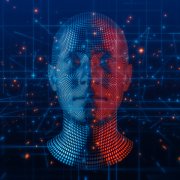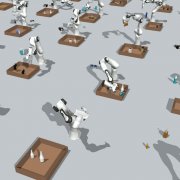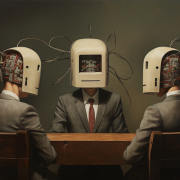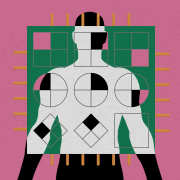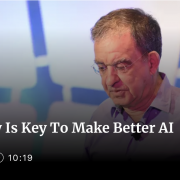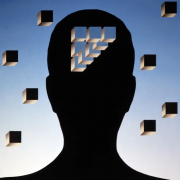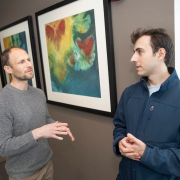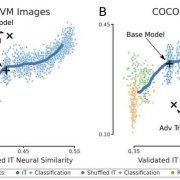October 30, 2023 - 2:00 pm
Two studies find “self-supervised” models, which learn about their environment from unlabeled data, can show activity patterns similar to those of the mammalian brain.
Anne Trafton | MIT News
To make our way through the world, our brain must develop an intuitive understanding of the physical world around us, which we then use to interpret sensory information coming into the brain.
How does the brain develop that intuitive understanding? Many...
October 19, 2023 - 11:30 am
Perovskite silicon tandem solar cell technology is a mouthful, but it’s basically perovskite crystals layered on top of silicon cells. The combination captures energy from the sun more efficiently than traditional silicon cells, creating powerful solar panels. That sounds simple enough, but designing an efficient perovskite silicon tandem solar cell isn’t easy because of its multi-layer architecture. A Singapore-based company called Cosmos...
October 17, 2023 - 2:00 pm
Researchers coaxed a family of generative AI models to work together to solve multistep robot manipulation problems.
Adam Zewe | MIT News
Anyone who has ever tried to pack a family-sized amount of luggage into a sedan-sized trunk knows this is a hard problem. Robots struggle with dense packing tasks, too.
For the robot, solving the packing problem involves satisfying many constraints, such as stacking luggage so suitcases don’t topple out of the...
October 16, 2023 - 1:30 pm
Images that humans perceive as completely unrelated can be classified as the same by computational models.
Anne Trafton | MIT News
Human sensory systems are very good at recognizing objects that we see or words that we hear, even if the object is upside down or the word is spoken by a voice we’ve never heard.
Computational models known as deep neural networks can be trained to do the same thing, correctly identifying an image of a dog regardless...
October 6, 2023 - 2:30 pm
Singleton Auditorium (46-3002)
The dream of understanding the mind and the brain and replicating human intelligence in machines was at the core of several new fields created at MIT during the ‘50s and ‘60s, including information theory, cybernetics, and Artificial Intelligence. The same dream was at the core of the NSF-funded,...
September 26, 2023 - 4:00 pm
McGovern Reading Room (46-5165)
Moderator: Ila Fiete; Panelists: Akshay Rangamani, Tomer Galanti, Sugandha Sharma and Sarthak Chandra
Abstract:
This discussion will feature panelists from the Poggio and Fiete labs describing ongoing work on deep classifiers and hippocampal-inspired networks, respectively. Following brief presentations by each panelist, Ila Fiete will steer a discussion to explore strengths, limitations and...
This discussion will feature panelists from the Poggio and Fiete labs describing ongoing work on deep classifiers and hippocampal-inspired networks, respectively. Following brief presentations by each panelist, Ila Fiete will steer a discussion to explore strengths, limitations and...
September 19, 2023 - 4:00 pm
MIBR Reading Room 46-5165
Aran Nayebi, ICoN Postdoctoral Fellow at MIT
Abstract:
Deep neural networks trained on high-variation tasks ("goals”) have had immense success as predictive models of the human and non-human primate visual pathways. More specifically, a positive relationship has been observed between model performance on ImageNet categorization and neural...
Deep neural networks trained on high-variation tasks ("goals”) have had immense success as predictive models of the human and non-human primate visual pathways. More specifically, a positive relationship has been observed between model performance on ImageNet categorization and neural...
September 18, 2023 - 12:00 pm
Researchers use multiple AI models to collaborate, debate, and improve their reasoning abilities to advance the performance of LLMs while increasing accountability and factual accuracy.
Rachel Gordon | MIT CSAIL
An age-old adage, often introduced to us during our formative years, is designed to nudge us beyond our self-centered, nascent minds: "Two heads are better than one." This proverb encourages collaborative thinking and highlights the...
September 12, 2023 - 4:00 pm
Singleton Auditorium (46-3002)
Prof. Michael Hasselmo; Director, Center for Systems Neuroscience; Boston University
Abstract: Recordings of neurons in cortical structures in behaving rodents show responses to dimensions of space and time relevant to encoding and retrieval of spatiotemporal trajectories of behavior in episodic memory. This includes the coding of spatial location by grid cells in entorhinal cortex...
August 30, 2023 - 2:45 pm
With hopes and fears about this technology running wild, it's time to agree on what it can and can't do.
By Will Douglas Heaven
When Taylor Webb played around with GPT-3 in early 2022, he was blown away by what OpenAI’s large language model appeared to be able to do. Here was a neural network trained only to predict the next word in a block of text—a jumped-up autocomplete. And yet it gave correct answers to many of the abstract problems that...
August 17, 2023 - 12:00 pm
John Werner - Contributor [I am an MIT Senior Fellow, 5x-founder & VC investing in AI]
Get ready for a lot of math…!
We have sort of an intuitive understanding of a big need in artificial intelligence and machine learning, which has to do with making sure that systems converge well, and that data is oriented the right way. Also, that we understand what these tools are doing, that we can look under the hood.
A lot of us have already heard of...
August 16, 2023 - 12:15 pm
Three graduate students forged a path to the same Picower Institute lab through participating in the MIT Summer Research Program in Biology and Neuroscience.
David Orenstein | The Picower Institute for Learning and Memory
Doctoral studies at MIT aren’t a calling for everyone, but they can be for anyone who has had opportunities to discover that science and technology research is their passion and to build the experience and skills to succeed....
July 20, 2023 - 10:45 am
Pictures conjured by the mind’s eye lack detail, despite how vividly you picture them
By Simon Makin
Here were the simple instructions given by a Harvard University assistant professor to people participating in a recent cognitive science study:
“Imagine the following scene. Visualize it in your mind’s eye, as vividly as you can: a person walks into a room and knocks a ball off a table.”
The professor, Tomer Ullman, then asked those in the...
July 12, 2023 - 4:00 pm
Researchers used fMRI to test ideas about complex decision-making
By Christy DeSmith, Harvard Staff Writer
How does the human brain navigate complex circumstances — say, driving through Harvard Square traffic at 5 p.m.?
One theory gaining support with psychologists and neuroscientists is that the brain creates causal models of the world that help with planning and execution. It’s akin to running mental simulations to see which outcomes are good...
July 6, 2023 - 5:00 pm
by Jennifer Michalowski, Massachusetts Institute of Technology
From cameras to self-driving cars, many of today's technologies depend on artificial intelligence to extract meaning from visual information. Today's AI technology has artificial neural networks at its core, and most of the time we can trust these AI computer vision systems to see things the way we do—but sometimes they falter. According to MIT and IBM research scientists, one way to...

